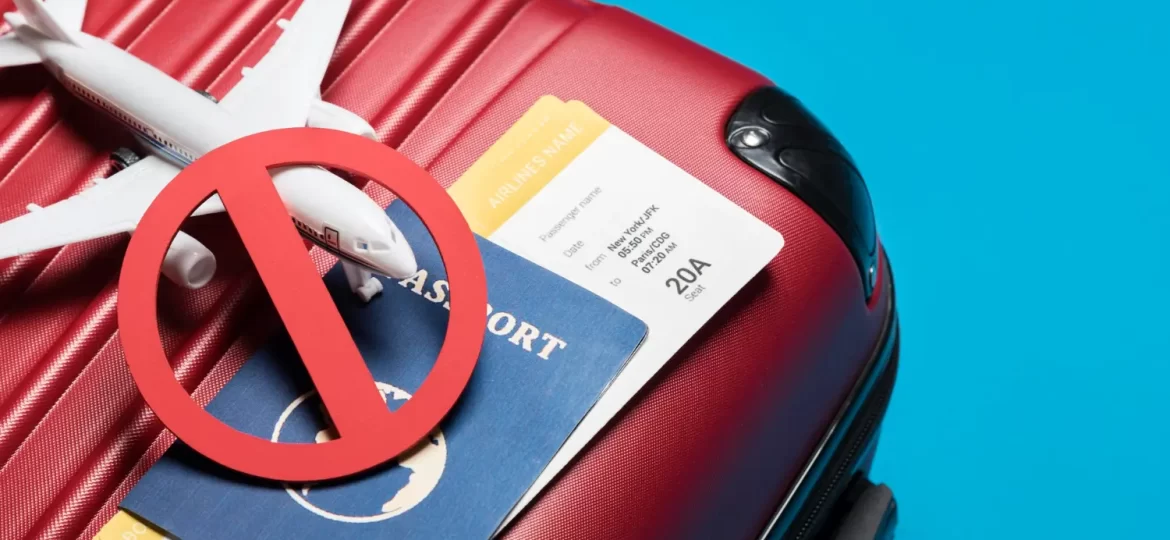
This is a detailed guide on the UAE travel ban, why it exists, how to challenge a ban, and how to find out whether you are barred from leaving the country. The main points are summed up here.
A person may be barred from entering or departing the United Arab Emirates (UAE) until they satisfy the requirements of a travel ban.
– It’s crucial to differentiate between a travel ban and a work ban. While a travel ban extends to entering or departing the country for any reason, a labor restriction only applies to job relationships that are under the purview of the Ministry of Human Resources and Emiratisation.
– A travel ban is not the same as an arrest warrant. A travel ban prevents someone from leaving the country, but an arrest warrant forces them to stay behind.
– Dubai Police offers an online facility to check for a travel ban, although it is only applicable to financial cases filed at Dubai police stations. Consult an attorney for a thorough review or if you are traveling outside of the UAE.
– Federal Law No. (6) of 1973 Concerning Immigration and Residence and its Executive Regulations are just two of the laws and rules that control the UAE’s travel prohibition.
– Bans on travel can be imposed for a variety of reasons, including criminal records, debts, violations of immigration laws, and personal issues.
– If you have been convicted of a felony, such as theft, drug abuse, or a case of a bounced check, you may be permanently banned from leaving the country.
A creditor can obtain a travel ban for unpaid debts, and the court must grant the request. When the loan is paid in full, the restriction is lifted.
Overstaying a visa or working without the proper paperwork might get you banned from entering the country indefinitely.
If a parent or legal guardian objects to a minor leaving the United Arab Emirates for whatever reason, the kid may be prohibited from leaving the country. The court makes its determination based on the specific facts and circumstances involved, as well as the child’s best interests. The particular grounds for a travel ban will determine the steps taken to impose and lift the ban.
The prohibition is automatically imposed during criminal investigations and is lifted upon a successful bail hearing. Restrictions imposed due to outstanding debt may be eased if certain conditions are met or with the consent of the creditor. Bans on immigration are usually permanent and can be enacted either automatically or voluntarily. The law gives the court the authority to make bans on family grounds.
The relevant laws and regulations pertaining to UAE travel bans are as follows:
- The Immigration and Nationality Act (Public Law No. 6 of 1973) Immigration to and residency in the United Arab Emirates are governed by this law. It specifies categories of foreigners who are not permitted entry or exit from the United Arab Emirates and includes laws about travel bans.
- Federal Law No. (6) of 1973, Executive Regulations Pertaining to Immigration and Residence: These rules, as revised by Ministerial Decree No. (83) of 2002, lay out in further detail how to enter and remain in the United Arab Emirates. In Article 94 of the Executive Regulations, the UAE may restrict the entry or exit of certain groups of foreign nationals.
- Articles 329 and 330: Legal procedures in civil proceedings, including the imposition and revocation of travel bans, are outlined in Law No. 3 of the United Arab Emirates (UAE). The Civil Procedures Code, including Articles 329 and 330, detail the requirements and procedures for issuing travel bans due to outstanding debts.
- Articles 45 and 46: The Criminal Procedures Law of the United Arab Emirates (UAE) specifies the steps to be taken in criminal cases. There are provisions for criminal investigations involving the issue of travel restrictions and arrest warrants. The procedure for issuing an arrest warrant for a suspect is outlined in Articles 45 and 46.
- Articles 149–151: Personal and family matters are addressed in Federal Law No. (28) of 2005, known as the “Personal Status Law.” Articles 149–151 of this law address whether or not a child may leave the United Arab Emirates, and, if so, under what circumstances.
These laws and regulations establish the overarching structure for travel bans in the UAE, however individual cases and the discretion of the relevant authorities may result in variations in procedure and practice. In order to get the most up-to-date and correct information, it is best to speak with a lawyer or other appropriate authority.
Click here to check If you have travel ban

